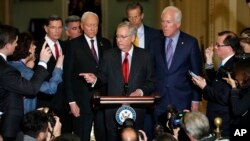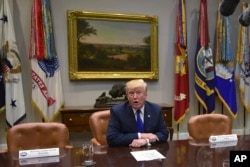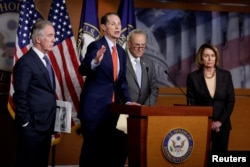Palpable tension and nail-biting uncertainty prevailed Tuesday on Capitol Hill as lawmakers grappled with a looming cutoff of federal funding, the future of U.S. taxation, and the fate of hundreds of thousands of undocumented immigrants brought to America as children.
Efforts to forge a bipartisan agreement to avert a U.S. government shutdown stumbled when Congress' top Democrats, House Minority Leader Nancy Pelosi and Senate Minority Leader Chuck Schumer, pulled out of a planned meeting with President Donald Trump after the president preemptively ridiculed the encounter.
"Meeting with Chuck and Nancy today about keeping government open and working," Trump tweeted. "Problem is they want illegal immigrants flooding into our Country unchecked, are weak on Crime and want to substantially RAISE Taxes. I don't see a deal!"
Pelosi and Schumer responded with a joint statement.
"Given that the President doesn't see a deal between Democrats and the White House, we believe the best path forward is to continue negotiating with our Republican counterparts in Congress instead," the Democratic leaders said. "We don't have any time to waste in addressing the issues that confront us, so we're going to continue to negotiate with Republican leaders who may be interested in reaching a bipartisan agreement."
The U.S. government's authority to spend funds expires December 8. A partial shutdown will occur unless both houses of Congress pass a funding extension.
Republican House Speaker Paul Ryan and Senate Majority Leader Mitch McConnell responded to the day's developments with a statement of their own.
"We have important work to do, and Democratic leaders have continually found new excuses not to meet with the administration to discuss these issues," Ryan and McConnell said. "Democrats are putting government operations, particularly resources for our men and women on the battlefield, at great risk by pulling these antics."
Tax bill
Overshadowing the fiscal deadline is an ambitious Republican drive to rewrite America's tax code by year's end. Trump sought to rally Senate Republicans by visiting their weekly caucus meeting Tuesday, but questions remained as to whether the tax bill will attract at least 50 votes in the 100-member chamber.
"It's a challenging exercise — think of sitting there with a Rubik's Cube trying to get to 50," McConnell told reporters after the Trump visit. "We do have a few [Republican] members who have concerns, and we are trying to address them."
The bill would permanently cut corporate taxes, temporarily cut income taxes, and add more than $1 trillion to America's national debt over a decade. Two Republican senators have objected to the legislation as currently written, saying its benefits are tilted too heavily in favor of corporations. Several others have expressed grave concern the bill will raise the nation's debt.
The House of Representatives passed their own tax bill earlier this month. With a slim, two-seat Senate majority, Republicans can afford only two "no" votes from their ranks, given unified Democratic opposition.
"This plan would bankroll massive tax cuts for the wealthiest people in America and the largest corporations," said Illinois Democratic Senator Dick Durbin. "This tax plan by the Republicans will not help working families."
"A 'yes' vote on this tax bill means voting for a growing economy, more jobs, higher wages and more take-home pay," countered Republican Senator John Cornyn of Texas. "A 'no' vote is a vote for stagnant wages, fewer jobs."
Immigration
Other issues before Congress could attract bipartisan solutions, including Trump's revocation of an Obama administration policy that shielded some 800,000 young immigrants from possible deportation. Lawmakers have crafted bipartisan legislation allowing undocumented immigrants who were brought to America as minors to remain and work in the United States, but nothing has been enacted so far.
Some Democrats have threatened to oppose spending bills unless a measure codifying some version of the Deferred Action for Childhood Arrivals program, known as DACA, is included.






